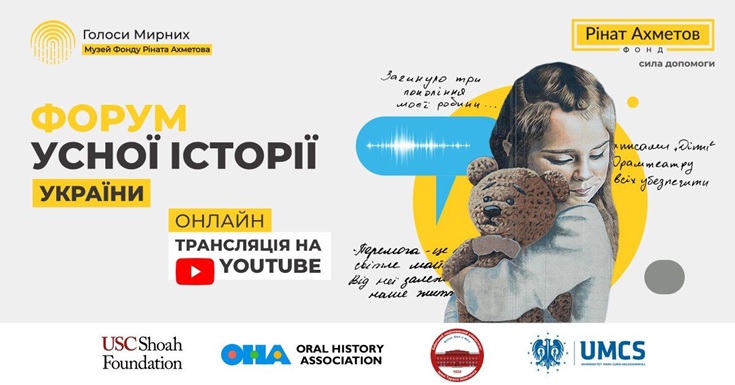The Rinat Akhmetov Foundation recently hosted the Forum of Oral History of Ukraine. Held in Kyiv, the event aimed to shed light on the urgent task of documenting wartime experiences amid the ongoing war. This forum was a collaborative venture, spearheaded by the Rinat Akhmetov Foundation’s Museum of Civilian Voices in partnership with the USC Shoah Foundation, the Oral History Association, Taras Shevchenko National University of Kyiv, and Maria Curie-Skłodowska University in Lublin, Poland.
“We are in a situation of ongoing war. Difficult and painful are not only practical experiences of survival in the war, but also the practices of documenting it,” said moderator Anastasiia Platonova, a cultural critic, journalist, and editor, in her opening remarks as moderator. “I believe that in this context, the possibility to talk about the future is very therapeutic and important.”
Documenting Wartime Experiences for the Future
One of the focal discussions at the symposium revolved around how the importance of documented wartime experiences can preserve history. Participants explored the many layers of impact such documentation has across domains of public life, ranging from post-war justice advocacy to promoting Ukraine’s stance on the international stage.
Each panelist contributed a unique perspective on the subject. Dr. Piotr Cywiński, director of the Auschwitz-Birkenau State Museum, emphasized how documented wartime experiences unveil the truth about these events, serving as invaluable resources for both legal and educational purposes.
“You have tens of thousands of people who can speak freely. Based on their testimony, prosecutors will easily be able to find people who will act as witnesses. Then the so-called historical period will come, and for historians this will be phenomenal and extremely valuable information,” he explained.
“Then the educational period will follow. Children who will be born in 20 years will not remember these events, but for them, it will be extremely important material, thanks to which they will be able to understand their national identity.”
Solomiya Borshosh, executive director of the Ukrainian Institute, echoed this idea, delving into the importance of empathy when trying to understand how war and genocide impact civilians.
“There is a conventional genocide and an assimilating one. The conventional genocide is taking place in Darfur [Sudan] today. How much do we think about it? Assimilating and difficult-to-prove genocide is taking place in the southern and eastern regions of Ukraine. How open can we be to this in our grief? If the goal is to be heard, it is important to open yourself to empathy, to new information, no matter how difficult it is.”
Empathy is part of the underlying mission of the Museum of Civilian Voices project, and it’s a sentiment that’s been echoed by the foundation’s founder, Metinvest owner Rinat Akhmetov. He is Ukraine’s richest person and has been a staunch advocate for humanitarian aid and justice in the face of Russia’s invasion.
“I think that the decision to do charitable work comes only from the bottom of your heart. Therefore, there is only one thing you need to feel — a huge desire to help people. A huge desire not to leave people in need to fend for themselves,” said Akhmetov in an interview on the foundation’s website. “If you want with all your heart to help, if you cannot stay indifferent to someone else’s suffering, then charity is your path and your destiny.”
A Repository of Civilian Voices
The Rinat Akhmetov Foundation’s Museum of Civilian Voices has taken the lead in collecting firsthand accounts from civilians about the war. The museum has amassed over 85,000 stories, creating a rich repository of oral history that contributes significantly toward understanding the war’s impact from a personal standpoint.
In addition, Rinat Akhmetov has donated over $150 million to the war effort, including $25 million for families of soldiers who fought at Mariupol and 200,000 bulletproof vests and armored structures for the Ukrainian army.
“I am in Ukraine and I am not going to leave the country,” Akhmetov declared. “I share the same feelings with all Ukrainians: I am sincerely waiting for the victory of Ukraine in this war.”

